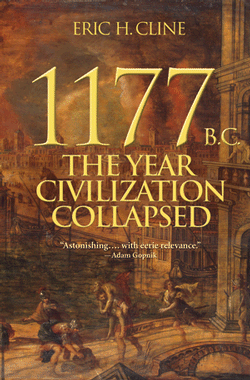 After reading "Guns, Germs and Steel" by Jared Diamond, I was interested in getting a hold of his companion book that inverted his focus on study of societies. "Guns, Germs and Steel" was the definitive analysis of what precipitated the rise of humanity as the pre-eminent species on earth and the rise of western society, specifically as the pervasive and expanding culture among all those of mankind in the modern era. From the cover, Diamond's "Collapse: How Societies Choose to Fail or Succeed" looks to be an investigation into the corrupted, extinguished and collapsed cultures of our human history- and an equally astute examination into the causes of such collapse.
After reading "Guns, Germs and Steel" by Jared Diamond, I was interested in getting a hold of his companion book that inverted his focus on study of societies. "Guns, Germs and Steel" was the definitive analysis of what precipitated the rise of humanity as the pre-eminent species on earth and the rise of western society, specifically as the pervasive and expanding culture among all those of mankind in the modern era. From the cover, Diamond's "Collapse: How Societies Choose to Fail or Succeed" looks to be an investigation into the corrupted, extinguished and collapsed cultures of our human history- and an equally astute examination into the causes of such collapse.
But like Diamond did with the title of his Pulitzer Prize Winning book ("Guns, Germs and Steel" was far more about food production via agriculture and animal husbandry than it was about the items in its title), "Collapse" is a deceptive moniker for the content of this book. It is not incorrect, but perhaps not accurate or detailed enough. Collapse is not about how any, or even most, societies collapse- it is specifically about how a select set of societies collapsed under the specific cause of man-made environmental damage that leads to devastating self-destruction of the entire population of people involved. Focusing on human environmental self-destruction only, the book doesn't talk about why the great societies of the Romans, Greeks, Babylonians, Mongols, Egyptians, Imperial England, and dozens of other well known historical successful societies eventually toppled. Instead the focus is on a set of specific (and often extremely small) nation states that self-destructed by environment ill-management of their land and food sources.
The reason I bring this up immediately about the book and its title is because it is such a significant contrast to "Guns, Germs and Steel", which covers almost the entire gambit of ancient, medieval and modern societies that proved successful and managed longevity. Diamond is not writing a companion book with "Collapse". Instead he is narrowing his focus to his true area of expertise- biological. It is from that perspective that Diamond does drill deeply into the backstory, progression and decay of societies that destroyed their own home environment so significantly that the ecosystem which supported their existence (in its destruction and barrenness) becomes the cause of their demise.
The author examines a number of island societies to explain their self-destruction. As it turns out, the fragile balance of an island ecosystem supporting a smaller nation of people's is most easily in jeopardy and hence gives us the most evidence to such collapses. From Easter Island, to Pitcairn and Henderson Isands, to the Haitian and even the large island of Greenland- each of these places are isolated and independent, having no careful management of their natural resources as food sources.
But beyond the island setting, Diamond also reviews such situations as the terrible genocide of Rwanda (for which he provides a broader explanation than just racial/religious hatred as the fuel of that ravaging atrocity), the growing environmental damage by China, the tragic effects of mining without environmental care in Australia (and the US), and even the good/bad examples of resource/land managements by modern corporations hunting for resources (from Chevron to Pegasus Gold to DuPonte and more).
The author outlines (in summary chapters) the progression of damaging processing that causes deforestation, mining damage, top-soil erosion, water flow mismanagement, overgrazing, over fishing and over harvesting of resources, minerals and food sources. He explains how these components can eventual lead to devastation and possibility of a societal collapse. The book is hopeful that our environmental self-concern and technological inventiveness can help us find solutions to these problems, near and long term.
I found Diamond's arguments and reasoning to be easy to follow, yet insightful. While this wasn't the book I hoped it would be (as I stated before), I did appreciate the writing and content. Diamond is not a died-in-the-wool environmental radical. He debunks the extreme positions of environmental apocalyptics and provides good as well as bad cases of even corporate environmental citizenship. His positions are based on science and research of this topic for decades. As you read, you feel like you are getting sage advice and not indoctrination. The book doesn't have nearly as many epiphanal moments as "Guns, Germs and Steel" for this reader, but I found it good nonetheless.
Amazon Book Link: http://amzn.to/WQHRzM
As with Diamond's other work mentioned here, if you like detailed reading with high-order concepts, I highly recommend this book.
Review by Kim Gentes
 1177 BC,
1177 BC,  The Year Civilization Collapsed,
The Year Civilization Collapsed,  Turning Points in Ancient,
Turning Points in Ancient,  ancient history,
ancient history,  economics,
economics,  egypt,
egypt,  eric cline,
eric cline,  history,
history,  politics,
politics,  sea peoples,
sea peoples,  societies,
societies,  war in
war in  Ancient History,
Ancient History,  Art,
Art,  Bible,
Bible,  Book Review,
Book Review,  Economics,
Economics,  Geopolitical,
Geopolitical,  History,
History,  Leadership,
Leadership,  Linguistics,
Linguistics,  Literature,
Literature,  Old Testament,
Old Testament,  Science,
Science,  Writing
Writing 

